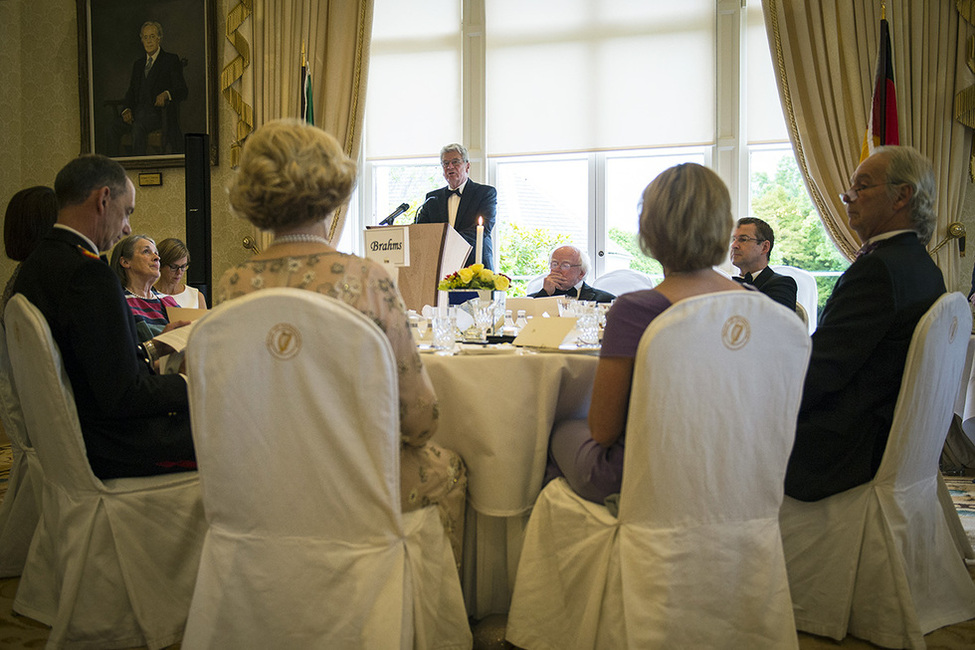Thank you for this warm welcome in your Residence in the heart of the Phoenix Park, this Dublin oasis. I would like to begin by articulating my respect for you. The English language has a wonderful expression for someone who excels in a multitude of areas. As we seem to have no proper equivalent in German, I will say it in English: You are a Renaissance man. You, Mr President, are a man of letters, a poet, you are well versed in philosophy and Irish history, in sociology and, of course, in politics. You are a passionate defender of democracy and pluralism.
In your inaugural speech in 2011, you spoke the following words: The demands and the rewards of building a real and inclusive Republic in its fullest sense remains a challenge for us all, but it is one we should embrace together.
This is true with respect to any republic or democracy – they draw their strength from the fact that they give everybody’s interests reasonable consideration and from the commitment of their citizens to the common good. This is precisely what you, Mr President, have made plain time and again.
For many people around the world, Ireland is an almost mythical place, the Emerald Isle
, a place of magical landscapes with an enduring Celtic heritage. Irish folklore with its wealth of legends and myths is one of the richest and most varied in the world. Even the Brothers Grimm fell under its spell. And, as if to evince the appeal of Irish culture, 17 March has become a day of joyous celebration for people all around the world. St Patrick’s Day, which commemorates the patron saint of Ireland, is celebrated as much in Shanghai and Melbourne as it is in Toronto and Berlin. Even the Berlin Radio Tower has been bathed in green light!
Hundreds of thousands of German tourists visit Ireland each year. They are received here with the hospitality
for which your country is so famous. What is less known nowadays is that the word hospitality
falls far short of describing what the Irish did for the Germans after World War II. Under Operation Shamrock, Irish families took in around 400 children from Germany to save them from starvation and deprivation in their homeland. This generosity created lifelong bonds. Some of the children remained in Ireland as adults, others kept on coming back.
And in 1990, as the country then holding the Presidency of the Council of the European Communities, Ireland played a key role in bringing the process of German unification to completion. For that, Mr President, we Germans are and will remain grateful.
Our two countries enjoy close economic ties. This is nothing new. As far back as 1925, Siemens began work on the construction of the Ardnacrusha power plant, which is still producing power today. The German KfW (Reconstruction Loan Corporation) is currently one of the initial funding partners of the Strategic Banking Corporation of Ireland, which facilitates lending to small and medium-sized enterprises, and thereby helps to nurture economic prosperity.
Over the course of its history, Ireland has time and again proven impressively that it knows how to master change, to seize its chances and to get back on course. As we know, the housing crash and financial crisis led to economic and social disruption in Ireland, to high unemployment and also to the departure of many talented young people. But Ireland took determined action and quickly managed to stabilise its economy. Your country’s efforts have made it an example for certain other states within the European Union. It is vitally important to us all that the entire EU will one day be able to emerge strengthened from this crisis.
The fact that the Irish people backed the measures taken can also be inferred from Ireland’s continued strong commitment to Europe That, too, is something the country has in common with Germany and the Germans, who want to be dependable and supportive Europeans, also in times of crisis.
I am relieved that a path to a compromise with Greece was found today. This shows that there is willingness to work together towards a European solution.
Mr President, ladies and gentlemen,
In these times of crisis, we Europeans have noticed how important exchange is if we wish to improve our understanding of each other. Seventeen days ago, Queen Elizabeth II visited us in Berlin. Four years ago, you received the Queen on a historic visit here in Dublin. Ireland deserves great respect for its successful and certainly also difficult reconciliation with Britain. Time and again, Ireland was involved in the search for a solution to the conflict in Northern Ireland, thereby demonstrating its readiness to shoulder responsibility. Ireland’s sense of responsibility is also reflected in the role the country assumes at the international level. This is most clearly seen in Ireland’s active participation in the United Nations, its contributions to peacekeeping missions, and its accomplishments in the field of development aid.
In conclusion, allow me to quote an old Irish saying: Ní heaspa go díth carad
– There is no lack so bad as the lack of a friend.
In this spirit, let us wish that the friendships between Ireland and Germany grow yet more numerous! And so I ask you to raise your glasses and drink with me to Irish-German relations and to a bright future for both our countries!


